(精品)九年级英语第四单元知识点section A 含练习
2024年人教版九年级英语上册Unit 4Section A (Grammar Focus—4c)

第三课时Section A(Grammar Focus—4c)教学目标通过本课的学习,学生能够:1.理解并掌握本课时重点词汇:European、African、British等。
(获取信息)2.使用探究性学习策略,对语法表格信息进行知识性梳理,并在口语交际中正确理解使用used to结构。
(梳理整合)3.通过询问并表达自己和他人过去各方面的变化,探究表述过去习惯的used to结构的用法,进一步拓展语言知识,发展语言技能,使语言表达更加准确。
(内化应用)4.明白事物是在不断变化发展的道理,养成积极向上的心态。
(迁移创新)语篇研读What:本课语篇共包含四部分,一是呈现本单元重点句式的语法聚焦表格;二是运用used to结构书写句子;三是以填写表格的形式描述Emily5年前与现在的对比;四是和同伴展开的一个口语交际的对话练习。
Why:通过表格形式呈现本单元的重点句式,有利于学生清晰地感知语法结构,进行观察和归纳,帮助学生发现used to结构的使用规律,在归纳中尝试总结其用法。
How:从表格的例句到后面紧跟的三个语法练习,培养学生积极与他人合作,帮助学生通过不同方式巩固上述所学的语法知识,从书面练习过渡到口语练习,同时学会举一反三。
教学过程设计理念:以《义务教育英语课程标准(2022年版)》核心素养为导向,以单元主题为引领,基于语篇的育人理念,体现《义务教育英语课程标准(2022年版)》“学思用创”的英语学习活动观和“教—学—评”一体化设计理念。
教学目标学习活动效果评价Activity1:Grammar Focus通过朗读句子发现规律Read the sentences of GrammarFocus.观察学生是否能够熟练朗读句子设计意图通过朗读句子,让学生初步感知used to结构【学习理解】Activity2: Group work ed to的含义ed to的基本用法观察学生是否能够总结出used to的相关小组合作探究找出规律ed to在其他句式中的应用ed to在there be结构中的应用5.易混短语的辨析用法,根据实际情况给出必要的指导和反馈设计意图通过小组合作,充分发挥学生的主观能动性,掌握used to 的相关用法【学习理解】Activity3:Exercise 通过练习巩固用法Work on4a—4c.观察学生是否能完成练习任务,根据实际情况给出必要的指导设计意图通过小组合作,进一步理解used to的用法,巩固对语法知识点的掌握,在实践中运用本单元语言知识及语法知识,巩固所学语言知识,提高语言技能【应用实践】Activity4:Summary 提炼知识点总结used to的相关用法观察学生对used to结构的掌握情况,并给出指导设计意图以图例形式让学生概括总结本单元重要语法知识used to 的用法,帮助学生在日常生活中运用此结构进行表述【迁移创新】板书设计Unit4I used to be afraid of the dark.Section A(Grammar Focus—4c)used to do didn’t use to do Did…use to do used to dobe used to doingbe used to do/be used for doing作业设计基础型作业:Recite the sentences in Grammar Focus.实践型作业:List the things you used to do when you were a child.拓展型作业:Write a passage about what you used to be afraid of.教学反思。
Unit4SectionA练习人教版英语九年级全册
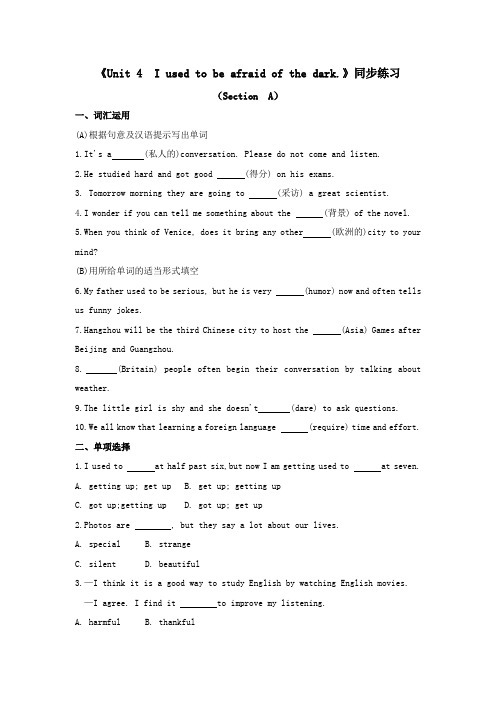
《Unit 4 I used to be afraid of the dark.》同步练习(Section A)一、词汇运用(A)根据句意及汉语提示写出单词1.It's a (私人的)conversation. Please do not come and listen.2.He studied hard and got good (得分) on his exams.3. Tomorrow morning they are going to (采访) a great scientist.4.I wonder if you can tell me something about the (背景) of the novel.5.When you think of Venice, does it bring any other (欧洲的)city to your mind?(B)用所给单词的适当形式填空6.My father used to be serious, but he is very (humor) now and often tells us funny jokes.7.Hangzhou will be the third Chinese city to host the (Asia) Games after Beijing and Guangzhou.8.(Britain) people often begin their conversation by talking about weather.9.The little girl is shy and she doesn't (dare) to ask questions.10.We all know that learning a foreign language (require) time and effort.二、单项选择1.I used to at half past six,but now I am getting used to at seven.A. getting up; get upB. get up; getting upC. got up;getting upD. got up; get up2.Photos are , but they say a lot about our lives.A. specialB. strangeC. silentD. beautiful3.—I think it is a good way to study English by watching English movies.—I agree. I find it to improve my listening.A. harmfulB. thankfulC. carefulD. helpful4.Our government is looking for some ways, including the 3-child policy (政策) to the problem of ageing population (人口老龄化).A. agree withB. start withC. compare withD. deal witha number of books in the library and the number of them increasing.A. has; isB. have; areC. are; isD. is; are三、根据汉语意思完成句子(每空一词)1.为了帮助家人,我这周开始学习做家务活了。
Unit4 Section A 3a-4c.教学设计和课时作业含答案 人教版九年级英语全册
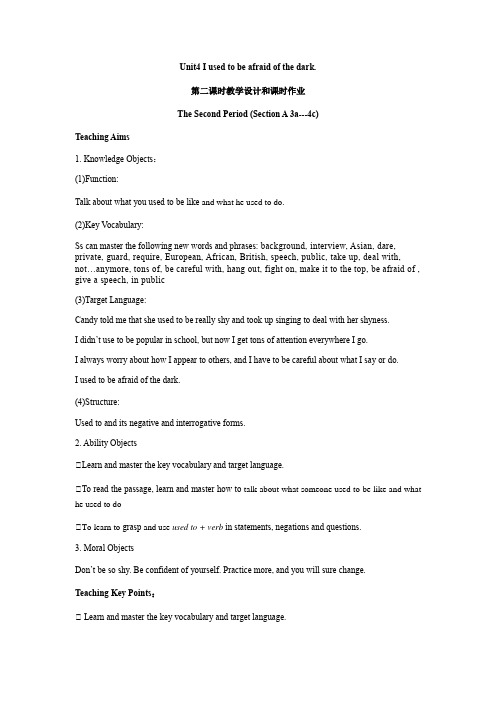
Unit4 I used to be afraid of the dark.第二课时教学设计和课时作业The Second Period (Section A 3a---4c)Teaching Aims1. Knowledge Objects:(1)Function:Talk about what you used to be like and what he used to do.(2)Key Vocabulary:Ss can master the following new words and phrases: background, interview, Asian, dare, private, guard, require, European, African, British, speech, public, take up, deal with, not…anymore, tons of, be careful with, hang out, fight on, make it to the top, be afraid of , give a speech, in public(3)Target Language:Candy told me that she used to be really shy and took up singing to deal with her shyness.I didn’t use to be popular in school, but now I get tons of attention everywhere I go.I always worry about how I appear to others, and I have to be careful about what I say or do.I used to be afraid of the dark.(4)Structure:Used to and its negative and interrogative forms.2. Ability Objects①Learn and master the key vocabulary and target language.①To read the passage, learn and master how to talk about what someone used to be like and what he used to do①To learn to grasp and use used to + verb in statements, negations and questions.3. Moral ObjectsDon’t be so shy. Be confident of yourself. Practice more, and you will sure change.Teaching Key Points:① Learn and master the key vocabulary and target language.①To learn to understand and use used to + verb in statements, negations and questions.Teaching Difficult Points :①Learn and master used to + verb in statements, negations and questions correctly.①To understand the passage, practice how to talk about what someone used to be like and what he used to doTeaching Methods :The Situational Teaching Approach, Task -based language teaching method, The Gaming teaching Method.Teaching Aids :The pictures about amusement park, PPTTeaching Procedures :Step 1 Review (About 4 minutes )Greet the class as usual.Show the photos of Han Hong and talk about themwith students.T: Did she use to be thin?Ss: Yes, she used to be really thin.T: What’s she like now?Ss: He’s heavy now.Have students use “used to” and “now” to talk about the following picture with their partners.Step 2 Play a game (About 5 minutes )Play a guessing game.Choose a student in each group to describe another student’s appearance, personality or hobby in the past, then the others guess who he/she is. The group that has correct descriptions is the winner.Step 3 Practice(About 6 minutes)Have a free talk with a student.T: S1, what did you like doing three years ago?S1: Umm, I liked playing basketball.T: You used to play basketball, didn’t you?S1: Yes, I did.T: Did you use to play the piano?S1: No, I didn’t.T: (to the class) S1 didn’t use to play the piano.Teacher writes the sentence on the Bb and tells students that it’s a negative sentence of “used to”.Help students find out how to turn the statement into negative form. Then explain it to the students and give an example.Subject + used to do sth.→Subject +didn’t use to do sth.He used to have short hair. →He didn’t use to have short hair.Have students read the example in 4a. Then ask them to write sentences using “used to” according to the example. Move around and give them some help if they need.Call some different students to say their sentences and check them in class.Step 4 Grammar Focus (About 4 minutes)Have the students read and remember the sentences in Grammar Focus by themselves, and then have them sum up the forms of the declarative sentence, negative sentence and interrogative sentence of “used to”. Teacher writes the structures on the Bb and gives some explanations.Subject + used to do sth. →Subject +didn’t use to do sth.→Did + Subject + use to do sth.?Then have the students read and remember the responses in Grammar Focus, tell them how to answer the questions.Present three sentences and ask students to turn them into negative sentences and questions.1. She used to be quiet.2. He used to wear glasses.3. I used to play computer games.Ask the students to work individually. Then call some students to report in class and praise the students who don’t have any mistakes.Step 5 Writing practice (About 5 minutes)Have students read the information about Emily in the chart of 4b, and then call one student to read the first line and the example. Tell them they need write a sentence with the information given. Remind them to pay attention to describe the past things using “used to” or “didn’t use to”.Have students write the sentences individually according to the information given. Then call different students to read their sentences and help them correct any mistakes.Have students put the sentences together into a passage about Emily. Ask two students to read their passages and see how Emily has changed.Step 6 Reading (About 11 minutes)Lead-in:T: People sure change. We have seen how Emily has changed. How has Asian pop star Candy Wang changed? Now let’s read the article together and find how Candy has changed.While-reading:First, have students to read the information about Candy in the box and tell them the information appears in different paragraphs. Ask them to listen to the article in 3a and identify the paragraphs in which the information is.Play the recording and ask them to number the information 1-3.Teach some new words. Then call three students to read the article and check the answer. At the same time, have other students find out key phrases and key sentences.Show the following questions, have students read the passage with the questions and find the answers to the questions.①What did Candy use to be like?①Did she use to be popular in school? What about now?①Why does Candy think too much attention is a bad thing?①How does Candy think young people can succeed?Call some students to answer the questions and check the answers in class.Have students read the article again and complete the sentences in 3b by themselves. Then have different students say the answers and check them in class.Help students sum up some key language points and the teacher help explain the things they don’t understand.After-reading:T: Suppose you are the interviewer and you’ll interview Candy, what questions will you ask? Please list your questions.Have students list their interview question, then interview their partners using the questions.Call some pairs to have an interview in front of class. Choose a best “interviewer” and a best “star” and praise them.Step 7 Pairwork(About 6 minutes)T: (Show a picture of giving a speech) I used to be really shy and I used to be afraid of giving a speech in public. Did you use to be afraid of giving a speech in public?Teach the new words “speech” and “in public” with the picture.Show the pictures and ask “Did you use to be afraid of…” and “Are you still afraid of…?, have students answer and check the boxes in 4c.Play an interview game.Have students interview their partners about what they used to be afraid of and are still afraid of now. Then change roles to practice.A sample example:A: Did you use to be afraid of the dark?B: Yes, I did.A: Are you still afraid of the dark?B: No, I’m not. How about you?A: Me? Oh, I used to be afraid of the dark, but now I’m not afraid of it.B: Wow! You are really brave.Call several pairs to role-play their conversations in class.Step 7 Summary(About 3 minutes)Today we have learned an article about Asian pop star Candy and known how she has changed from a shy girl to a pop star. It tells us that one shouldn’t be shy and be confident of himself and he will sure change.Ask students to sum up the important phrases and the key sentence they learned.Call some students to explain how to change the declarative sentences of “used to” into negative sentences and questions.Step 8 Homework(About 1 minutes)Write a passage about a family member who has changed most. What did he /she use to be afraid of and like? What about now?Blackboard Design:Unit4 I used to be afraid of the dark.Section A 3a-4cSubject + used to do sth. →Subject +didn’t use to do sth. S1 didn’t use to play the piano.→Did + Subject + use to do sth.? Did you use to play the piano?Yes, …did./No, …didn’tshe used to be really shy.I didn’t use to be popular in school.课时作业设计①.根据句意、汉语意思和首字母提示完成句子。
九年级第四单元Unit 4 I used to be afraid of the dark. Section A (1a-2d)
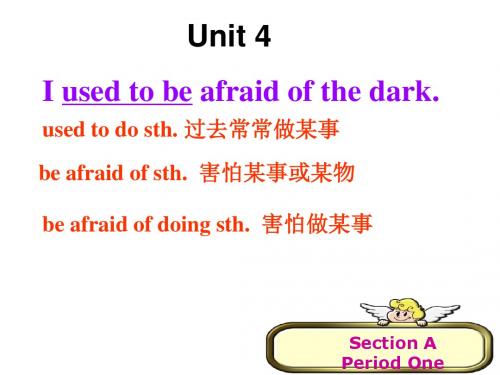
Read the conversation again and complete the blanks.(2d) Bill has changed so much! He used to be ____ and _____. His face always ______ ___ when he talked to girls! He studied hard and got good ______ on his exams. He used to be ____, but now he is ___ and _______.
serious(严肃的) be serious with …对待…严肃、认真
1b Listen. Bob is seeing some friends
for the first time in four years.
1. Mario used to be _____. short He used to wear ______. glasses 2. Amy used to be ____. tall She used to have ______ short hair. 3. Tina used to have ____ red and ______ curly hair.
语法点2:
What is sb. like? 问外貌、性格(be like像prep.)
What does sb. look like? 问外貌(look like看起来像prep.)
What does sb. like?问喜好(like 喜欢v.)
语法点3:
You are Mario, aren’t you?你是马里奥,是吗?
What does she look like? She has…
人教版九年级英语 Unit 4 Section A(1a~2d) 精品课件

Now Appearance
3. What do you think of her?/ What is she like?
She is nice, friendly, active, ...
Look and talk
A: Did Mario use to be short? B: Yes, he did. He used to be really short. A: What’s he like now? B: He’s tall now.
Revision Pre-listening While-listening Post-listening Summary
Personality
Revision Pre-listening While-listening Post-listening
Summary
Brainstorm Can you think of more words or expressions about appearance and personality?
Appearance
Height tall, short, of medium height ...
Build heavy, slim, thin, of medium build ...
Other long straight hair, short curly hair, a round features face, big eyes, wear glasses ...
She used to have long straight hair, but now she has short straight hair.
九年级英语Unit4 Section A 基础测试卷(含答案)
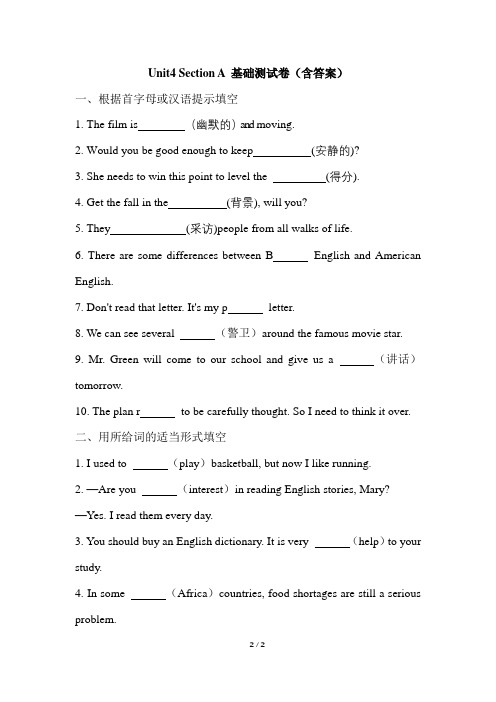
Unit4Section A 基础测试卷(含答案)一、根据首字母或汉语提示填空1. The film is (幽默的)and moving.2. Would you be good enough to keep (安静的)?3. She needs to win this point to level the (得分).4. Get the fall in the (背景), will you?5. They (采访)people from all walks of life.6. There are some differences between B English and American English.7. Don't read that letter. It's my p letter.8. We can see several (警卫)around the famous movie star.9. Mr. Green will come to our school and give us a (讲话)tomorrow.10. The plan r to be carefully thought. So I need to think it over.二、用所给词的适当形式填空1. I used to (play)basketball, but now I like running.2. —Are you (interest)in reading English stories, Mary? —Yes. I read them every day.3. You should buy an English dictionary. It is very (help)to your study.4. In some (Africa)countries, food shortages are still a serious problem.5. As we all know, France is a (Europe)county.6. The girl is very shy. She is afraid of (speak)in front of others.7. Lisa is my good friend. We have studied in the same school since she (come)to Shanghai.8. Her face went red with (shy)when she went into the crowded room.三、单项选择()1. —China is Asian county with a long history.—So it is.A. aB. anC. theD. /()2. Mr. Li is very . He always makes us laugh in class.A. correctB. directC. politeD. humorous ()3. Many successful people have the same quality—they never no matter what difficulties they've met.A. give upB. stay upC. cheer upD. turn up()4. It was dark outside and the little girl didn't dare out by herself.A. goesB. to goC. goingD. went()5. —I think learning English well time and effort.—I agree with you.A. requiresB. wastesC. discoversD. provides()6. She is a hard-working girl. I always see her in the library.A. readB. readsC. to readD. is reading ()7. We are surprised at the new look of our town, because it a lot in the past few years.A. changesB. changedC. will changeD. has changed ()8. I used to text messages, but now I'm used to WeChat(微信).A. send; useB. send; usingC. sending; usingD. sending; use四、根据汉语意思完成下列句子1. 尽管他失败了很多次, 但是他奋力坚持下来了.Although he failed many times, he .2. 现在托尼不再是一个顽皮的男孩了.Now Tony a naughty boy .3. 在公共场所大声说话是不礼貌的.It's impolite to speak loudly .4. 这个问题真的很难处理.It's really difficult to this problem.5. 玛丽决定开始从事写作.Mary decides writing.6. 有时我爸爸会步行去上班.My father goes to work on foot .7. 妈妈不允许我放学后跟朋友们闲逛.Mum doesn't allow me with friends after school.8. 事实上, 很多明星都不想得到太多的关注.In fact, many stars don't want .五、句型转换1. He used to wear sports shoes. (改为一般疑问句)he wear sports shoes?2. She used to have long hair. (改为反意疑问句)She used to have long hair, ?3. Celina used to be an outgoing girl. (改为否定句)Celina to be an outgoing girl.4. I have been away from my hometown for ten years. (改为同义句)It ten years I left my hometown.5. The girl is tall and thin. (改为感叹句)the girl is!六、补全对话根据对话内容,在下面横线上写出对话中所缺的单词Man: Are you Mary Johnson? I haven’t seen you since you 1 a little girl.Girl: Yes, I’m Mary Johnson, I’m 2 ,I don’tremember you.Man: That’s all right! You were too little. We 3 on the same street,and I worked with your father. You had straight blonde hair4 .It was very long.Girl: Yes, I did. But it 5 .My hair got darker—I didn’t dye it! But I did make it curly.Man: You look 6 your mother now.Girl: Thank you! But my mother has changed, too. Have you 7 her?Man: No, 8 has she changed?Girl: Well,she 9 to have dark hair, but she dyed it. It’s red now. She looks great! And she used to be heavy, but now she’s thin. She exercises every day.Man: She was always very outgoing. So was your father. Are you outgoing, too?Girl: Pm outgoing now. I used to be much 10 .1. 2. 3. 4. 5.6. 7. 8. 9. 10.参考答案Section A一、根据首字母或汉语提示填空1.humorous2.silent3.score4.background5.interview6. British7. private8. guards9. speech 10. requires二、用所给词的适当形式填空1. play 【解析】句意: 我过去常常打篮球, 但是现在我喜欢跑步. used to do sth. "过去常常做某事".2. interested 【解析】be interested in sth. "对……感兴趣", 为固定短语.3. helpful 【解析】根据句意和设空前的is可知此处应填形容词, 构成系表结构.4. African 【解析】修饰名词应用形容词, 故填African.5. European 【解析】修饰名词应用形容词, 故填European.6. speaking 【解析】be afraid of doing sth. "害怕做某事", 为固定搭配.7. came 【解析】根据主句的时态(现在完成时)和设空前的since 可知此处应填come的过去式.8. shyness 【解析】介词后可用名词, 故填shyness.三、单项选择1. B 【解析】考查冠词的用法. 根据上句句意"中国是一个历史悠久的亚洲同家"可知此处表泛指, 又Asian的读音以元音音素开头, 故用an.2. D 【解析】考查形容词词义辨析. 根据题干中的"He always makes us laugh in class"可知, 此处是说李老师很幽默. 故选D.3. A 【解析】考查动词短语辨析. give up放弃; stay up熬夜; cheer up 振奋起来; turn up调高. 此处表示"许多成功人士都有一个共同的品质—无论遇到什么困难, 他们从不放弃". 根据句意可知选A.4. B 【解析】考查固定搭配. dare do sth. /dare lo do sth. "敢子做某事", 符合题意.5. A 【解析】考查动词词义辨析. require 需要; waste浪费; discover 发现; provide提供. 根据上句句意"我认为学好英语需要时间和努力"可知选A.6. A 【解析】考查非谓语动词. see sb. do sth. 意为"看见某人做某事", 为固定搭配, 符合题意.7. D 【解析】考查动词时态. 此处是说, 我们对我们城镇的新面貌感到惊叹, 因为在过去的几年里它改变了很多. 根据设空后的时间状语"in the past few years"可知应用现在完成时.8. B 【解析】used to do sth. 意为"过去常常做某事", be used to doing sth. 意为"习惯做某事", 均为固定搭配. 根据句意可知答案为B.四、根据汉语意思完成下列句子1. fought on2. isn't; anymore3. in public4. deal with5. to take up6. from time to time7. to hang out 8. to get too much attention五、句型转换1. Did; use to2. didn't she3. didn't use4. has been; since5. How tall and thin六、补全对话l. were 2. sorry 3. lived 4. then 5. changed 6. like 7.seen 8. how ed 10. quieter。
人教版初三英语Unit4SectionA课文回顾及练习题(含详细解说)
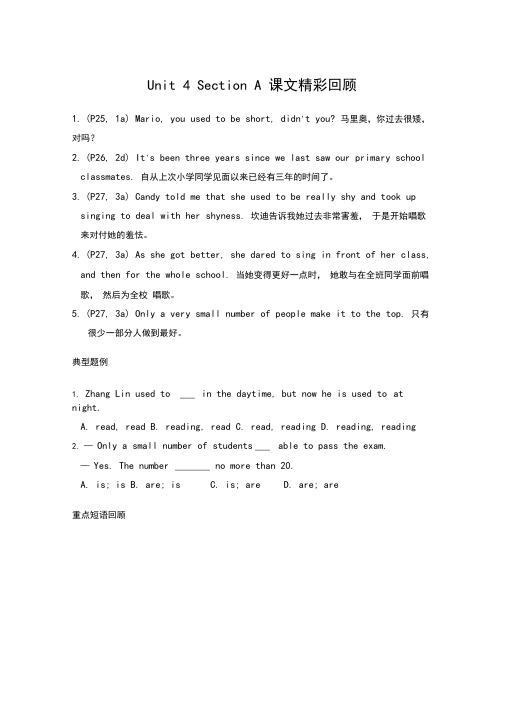
Unit 4 Section A 课文精彩回顾1.(P25, 1a) Mario, you used to be short, didn't you? 马里奥,你过去很矮,对吗?2.(P26, 2d) It's been three years since we last saw our primary school classmates. 自从上次小学同学见面以来已经有三年的时间了。
3.(P27, 3a) Candy told me that she used to be really shy and took up singing to deal with her shyness. 坎迪告诉我她过去非常害羞,于是开始唱歌来对付她的羞怯。
4.(P27, 3a) As she got better, she dared to sing in front of her class, and then for the whole school. 当她变得更好一点时,她敢与在全班同学面前唱歌,然后为全校唱歌。
5.(P27, 3a) Only a very small number of people make it to the top. 只有很少一部分人做到最好。
典型题例1.Zhang Lin used to ___ in the daytime, but now he is used to at night.A. read, readB. reading, readC. read, readingD. reading, reading2.—Only a small number of students ___ able to pass the exam.—Yes. The number _______ no more than 20.A. is; isB. are; isC. is; areD. are; are重点短语回顾自我测试及解答【1 】She WaS Very shy, SO She USed to be _ 说话)in class.【2】I ' m afraid OfiVing a S ______ in public.【3】After that, he became more _______ (interest) in history.【4】He didn ' t dare _______ (SPeak) in front of the people.【5】At last, he made an important ____ 决定).【6】He won' t dare _____ his promise.A. breakB. to breakC. break ingD. breaks【7】 一Mike, you ' Ve got so many beautiful Stam P—Yeah. I ____ collect StamPS Whe n I WaS 8 years old.A. WaS USed toB. USed toC. am USed toD. USed【8】Mario is afraid of __ alone.A. be B bei ng C. is D. to【9】 _____ StUdy in No.4 MiddIe School?A. Did you USed toB. Do you USe toC. Do you USed toD. Did you USe to【10 】There ______ a SWimming pool here.A. USed to haveB. WaS USed to beC. USed to beD. is USed to hav ing1. u sed to do sth. 故去常常做某事 3. f rom time to time 时常;有时 5. take up 开始做 7. not …anymore 不再 9. worry about 为 . 担心 11. a small number of 少数13. give a SPeeCh 做演讲2. be afraid of Sth. 害怕某事 /物4. O n the SOCCer team 在足球队6. d eal with 处理;应对8. tonS of attention 很多关注10. hang out 闲逛12. give uP 放弃14. in PubliC 当众中考真题再现1.--Many StUdents dontknow how to ______ StreSS and become worried.--I think they'd better ask their teacher for help.A. argue WithB. deal WithC. quarrel WithD. come UP With2.In our school Iibrary there _ a number of books on SCience, and in theseyears the nu mber of them ___ grow ing Iarger and larger.A. are; isB. is; areC. have; areD. have; is3.--My aunt goes to climb mountains every SUn day.--Oh? BUt She ______ hate CIimbi ng mountains.A. used toB. was usedtoC. is usedtoUnit 4 Section A 课文精彩回顾1.(P25, 1a) Mario, you used to be short, didn't you? 马里奥,你过去很矮,对吗?【点拨】USed to意为过去常常”这是个固定结构,to后跟动词原形,而且没有人称和数的变化,它只有一种时态,只表示过去,而现在已经不再做了,因此常用助动词did进行否定或提问。
人教版英语九年级全册Unit4(备课精品):Section A 课文重难点精讲练
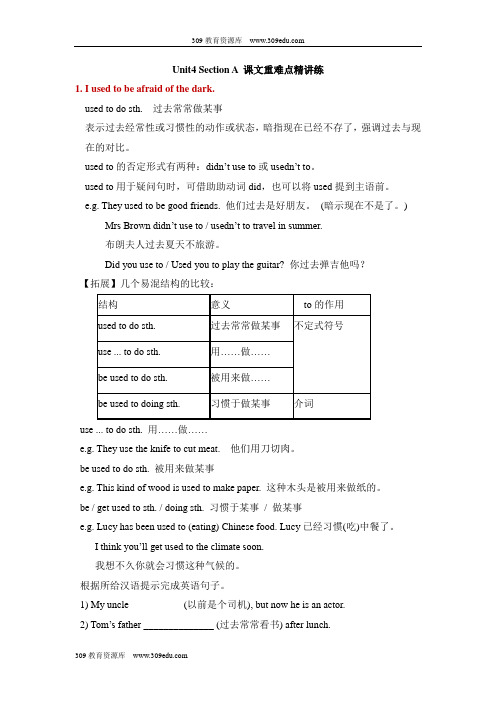
Unit4 Section A 课文重难点精讲练1. I used to be afraid of the dark.used to do sth. 过去常常做某事表示过去经常性或习惯性的动作或状态,暗指现在已经不存了,强调过去与现在的对比。
used to的否定形式有两种:didn’t use to或usedn’t to。
used to用于疑问句时,可借助助动词did,也可以将used提到主语前。
e.g. They used to be good friends. 他们过去是好朋友。
(暗示现在不是了。
)Mrs Brown didn’t use to / usedn’t to travel in summer.布朗夫人过去夏天不旅游。
Did you use to / Used you to play the guitar? 你过去弹吉他吗?【拓展】几个易混结构的比较:use ... to do sth. 用……做……e.g. They use the knife to cut meat. 他们用刀切肉。
be used to do sth. 被用来做某事e.g. This kind of wood is used to make paper. 这种木头是被用来做纸的。
be / get used to sth. / doing sth. 习惯于某事/ 做某事e.g. Lucy has been used to (eating) Chinese food. Lucy已经习惯(吃)中餐了。
I think you’ll get used to the climate soon.我想不久你就会习惯这种气候的。
根据所给汉语提示完成英语句子。
1) My uncle __________ (以前是个司机), but now he is an actor.2) Tom’s father ______________ (过去常常看书) after lunch.3) Mary ________ (以前常常骑自行车) to work, but now she _______ (习惯步行)to work.4) The pencil ________ (被用来书写).2. She still plays the piano from time to time.from time to time是一个固定短语,意为“间或;有时”,常在句中作状语。
人教版九年级全册英语Unit4 SectionA 知识讲解+专题练习学案(含答案)

Unit4 SectionA知识讲解1. Mario, you used to be short, didn’t you? 马里奥,你过去很矮,是吗?(1)used to意为"过去常常",后接动词原形,表示过去经常发生的动作或存在的状态(暗含现在已经不复存在)。
(2) 本句是一个反意疑问句,反意疑问句的特点是"前肯后否"或"前否后肯"。
2. see sb. doing sth. 看见某人正在做某事此结构中doing sth.作宾语补足语,强调动作正在进行。
而see sb. do sth. 看见某人做了某事,强调看见动作发生的全过程或看到动作经常发生。
3. deal with 应对;处理(1) deal with与do with两者都可以用来表示"处理",前者侧重于方式、方法,后者侧重于对象。
在句中,deal with与how连用,do with则与what连用。
(2)deal with 还意为"应付;涉及;论及"。
4. too much太多too much, much too 与too many的用法区别too much, much too, 用法区别看后头。
much后跟不可数,too后只跟形或副。
too many要记住,后面名词必复数。
5. helpful /’ helpfl/ adj.有用的;有帮助的helpful的相关短语:be helpful to sb. 对某人有帮助6. such /sʌtʃ/ adj.如此的;这样的such用作形容词,修饰名词。
主要用法有:(1)such+a(an)+adj.+单数可数名词+that从句。
(2)such+adj.+不可数名词+that从句。
(3)such+adj.+名词复数+that从句。
专题练习一、单项选择1.A _________ number of people took part in this activity, but only a _________ number of them made it to the top.A.many; few B.large; few C.large; small D.much; little2.My grandma used to ________ TV after dinner, but now she is used to ________ for a walk.A.watching; go B.watching; going C.watch; go D.watch; going 3.China and the US need a proper ________ about the trade problem.A.interview B.conversation C.report D.information 4.—The piano lessons are too hard for me. I nearly give up.—Please be more ________. I believe you’ll make it.A.careful B.helpful C.patient5.I used to ________ in the morning, but now I’m used to ________ before going to bed. A.reading; read B.read; reading C.read; read D.reading; reading二、完型填空As a child, I got angry quite easily and was not good at communicating with others.I still remember it was an early autumn. Some 6 started to turn yellow and the weather became cool. One day, as I was getting ready for school, my mother carelessly handed me my father’s vest(背心) instead of 7 . At that time, I was getting to have a 8 size than my father, so when I put on the vest, I felt as if I wasn’t able to breathe! I realized that it was a small mistake which was 9 by my mother, but somehow the breathless feeling was so strong that it made me very angry. My mother said sorry with a smile, but I shouted at her 10 thinking much. I got it off my body so wildly that I made a hole in it. I put on my own vest and rushed out of the house 11 my mother could stop me.Later, my mother shared her bad feelings with my father, “See what your son has done.” Instead of saying he would scold(责备) or beat me, my father 12 asked my mother to mend the vest.Later when my mother told me about my father’s response(反应), I felt terribly sorry for my bad behavior(行为). My father’s gentle kindness taught me a lesson which I would13 forget.On that day, I decided not to let anger 14 me any longer. Of course, there are times when I am angry. However, whenever that happens, I will try to remember my father’s 15 . It always reminds(提醒)me to think about others’ feelings when I get angry. 6.A.books B.walls C.phones D.leaves 7.A.hers B.his C.mine D.ours8.A.thinner B.smaller C.larger D.shorter 9.A.given B.made C.shown D.chosen 10.A.without B.about C.with D.of 11.A.after B.before C.when D.since 12.A.sadly B.angrily C.bravely D.quietly 13.A.never B.often C.always D.sometimes 14.A.forget B.help C.leave D.control 15.A.vest B.school C.anger D.mistake三、阅读单选Dear LucyHow are you? It has been a month since my family left Hong Kong for England and we are fine.England is very different from Hong Kong. The weather is terrible and it rains a lot. The buildings are funny. They are in rows and not high. I love them because the rooms are much larger. I’m having a wonderful at my new school and my new home!Mum and Dad are happy with their new jobs. But my brother Jack doesn’t like moving to England because he misses his friends so much.I’ve made lots of new friends at school. My teachers are really nice too and my English has improved a lot. After school, we can take part in relaxing activities such as sport, watching films or playing computer games. There’s a park near the school where I often go with the other students at the weekend.We are travelling back to Hong Kong for the summer holiday. I will visit you and bring you a present!Write back soon!LoveSandy16.Where did Sandy’s family live before?A.Hong Kong.B.Sydney.C.New York.D.London. 17.Sandy loves the buildings in England because their rooms are . A.cheaper B.warmer C.newer D.larger 18.How many people are there in Sandy’s family?A.2.B.4.C.6.D.8.19.Who does not like moving to England?A.Dad.B.Mum.C.Jack.D.Sandy. 20.What is the letter mainly about?A.Sandy’s summer holiday.B.Sandy’s parents.C.Sandy’s new classmates.D.Sandy’s new life.四、用所给单词的正确形式填空21.There are few people here,so it is very________ (crowd).22.As usual, our leader made his New Year's _________ on TV on Dec.31. (speech) 23.There used ______ (be) a quiet village here.24.Many of us are used to ________ (live) in the countryside. The air there is very clean. 25.Her ________ (shy) stopped her from doing better.五、完成句子26.能告诉我你打算如何处理你的旧衣服吗?Could you tell me how you will ________ ________ your old clothes?27.公共场所不允许大声喧哗。
人教版英语九年级上册 Unit 4 Section A (GF-4c)

Grammar Focus
Read the sentences.
I used to be short. Paula used to be really quiet.
I didn’t use to be popular in school.
She didn’t use to like tests.
You used to be short, didn’t you? Yes, I did. / No, I didn’t.
一般疑问句 Did + 主语 + used to be / do + 其他? eg. Did this building use to be a hotel?
这栋建筑物以前是一个酒店吗? Did you use to go to the library regulaly? 你以前经常去图书馆吗?
反义疑问句 主句 + didn’t + 人称代词? eg. Your brother used to have noodles as breakfast, didn’t he?
➢ Key sentences: 1. Grace used to watch a lot of TV. She didn’t use to watch a lot of movies. 2. Emily didn’t use to eat a lot of vegetables, but now she loves carrots and tomatoes.
九年级英语全册Unit 4 Section A (3a-3c)

Task 2 : 细读3a第一自然段, 回答问题。
1. What did CindtaykWe uapng开u始se;to be like? She used to be从r事ea;ll接y s纳h;y.占
2. What did she 据;t继o续d做eal with her shyness?
3. They really require _a__lo_t_o_f_t_a_l_e_n_t_a_n_d__h_a_r_d_w__o_r_k______.
4. Only a small number of people _m__a_k_e_i_t_t_o_t_h_e_t_o_p___.
W A.hmatakdeoeTBs .tihnpee3ewWt:dooetroCdcat.“hnbreeegcqceooutmnitrhteeee”xmtDm(根e.eaaa据npnip?n上egac下orafn文tbh获ee sw取uoc意rcde思sssaf)uc.clording
how she私ap人pea的rs to others.
2. She has to_b_e_c_a_r_e_fu__l _a_b_o_ut what she says or does.
3. She doesn’t have much p_r_i_v_a_te__ti_m__e_anymore.
4. _H_a_n_g_i_n_g__o_u_t_w_i_th__f_r_ie_n_d_s__is almost impossible for her now because there are always _g_u_a_r_d_s_a_r_o_u_n_d__h_e_r_.
(… used to …,but now …)
人教版九年级英语全一册知识梳理第四单元《Unit 4 Section A》
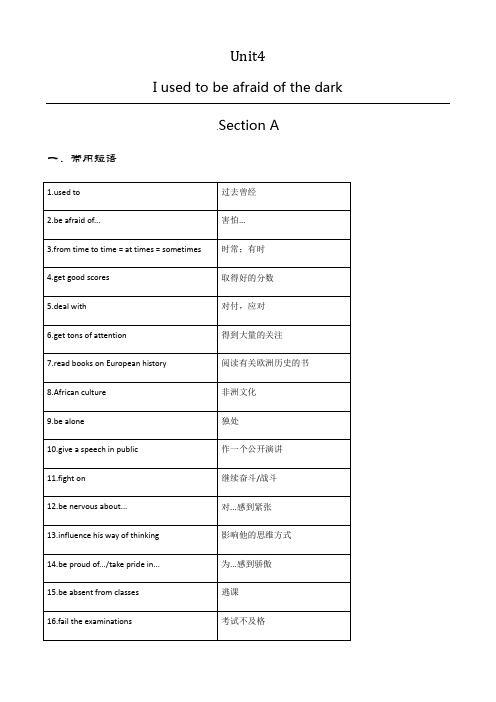
Unit4I used to be afraid of the dark.Section A一.常用短语二.考点精练▶考点一反义疑问句的用法这是一个反意疑问句。
此类反意疑问句的结构为:肯定的陈述句+ 否定的附加问句→“前肯后否”否定的陈述句+ 肯定的附加问句→“前否后肯”注意:前后两部分的人称数和时态等必须要保持一致!➩She doesn’t like shopping, does she? 她不喜欢购物,是吗?➩Your father went to the park, didn't he? 你爸爸去公园了,是吗?➩You don’t like classical music, do you? 你不喜欢古典音乐,对吗?【拓展】①对反意疑问句的回答,不管问题的提法如何,如果事实是肯定的用yes,事实是否定的用no。
②陈述句部分含有few(几乎没有)、little(几乎没有)、seldom(几乎不)、hardly(几乎不)、never(从不)或nothing(没有任何东西)等否定词,附加问句要用肯定形式。
➩He has never been to London, has he? 他从来没有去过伦敦,是吗?【易错提醒】无论何种形式的反意疑问句,依据事实来回答即可。
如果事实是肯定的,要用yes;如果事实是否定的,要用no。
只是要注意“前否后背”的答语中,yes和no与汉语意思正好相反。
➩He didn't pass the exam, did he? 他没有通过考试。
——Yes, he did. 不,他通过了。
(事实是肯定的)——No, he didn’t. 是的,他没有通过。
(事实是否定的)【小试牛刀】1.-- Steven had nothing for breakfast this morning, ______________ ?--No. Because he had a fever.A.hadn't heB.had heC.didn’t heD.did he2.David never fights with his classmates, _____________ ?A.does heB.doesn’t heC.is heD.Isn’t he答案:1.D2.A▶考点二 What + be + 主语 + like? 的用法2.What’s he like now? 他现在是什么样子?(P25 1c)1)What + be + 主语+ like? 用于提问人的外貌,译为“某人长什么样?”,相当于”What do / does + 主语+ look like?”,用于提问人的外貌(身材或长相)。
(精品)九年级英语第四单元知识点sectionA含练习
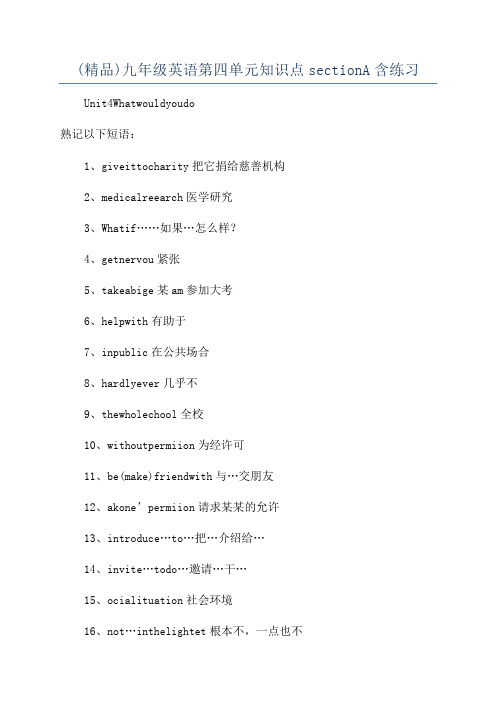
(精品)九年级英语第四单元知识点sectionA含练习Unit4Whatwouldyoudo熟记以下短语:1、giveittocharity把它捐给慈善机构2、medicalreearch医学研究3、Whatif……如果…怎么样?4、getnervou紧张5、takeabige某am参加大考6、helpwith有助于7、inpublic在公共场合8、hardlyever几乎不9、thewholechool全校10、withoutpermiion为经许可11、be(make)friendwith与…交朋友12、akone’permiion请求某某的允许13、introduce…to…把…介绍给…14、invite…todo…邀请…干…15、ocialituation社会环境16、not…inthelightet根本不,一点也不17、rightaway立刻,马上18、allday全天19、befriendlyto对…友好21、abithy有点害羞22、Englihpeechcontet英语演讲比赛23、repreentthecla代表班级25、let…down使…失望27、beureof+n./pron.beuretodo相信…beure+that从句28、theretofthetudent其余的学生29、havealotofe某perience(in)doingth在做某事方面有经验30、dealwith对付,处理32、giveadviceon…在…方面提出意见、建议33、byaccident偶然地,无意之中34、hurrytodoth匆匆忙忙干…35、aninternetfriend网友SectionA重点语法:1.IfIwereyou,I’dwearahirtandtie.1.tien领带,平局,得分相同,不分胜负V拴,扎,系,绑现在分词tying句型:tieth.to…把…栓到…上通过动词形式的变化来表示说话人对发生的动作或存在的状态所持的态度或看法的动词形式称为语气,虚拟语气表示说话人所说的话不是事实,而是一种祝愿,建议或是与事实相反的假设等。
人教版九年级英语全一册《Unit 4 Section A》作业同步练习题及参考答案

Unit 4 I used to be afraid of the dark.Section A(la-2d)—、单项选择LShe used to have long hair but now she has ______ hair.A.blackB.yellowC.shortD.straight2.—an you help me?A.SurelyB.Ican' tCA can D.Sure3.____________________________ Jack is good at basketball.He is the city basketball team.A.atB.withC.onD.of★4.—Don" t you like playing soccer?— _____ .1 often play it after school.A.YesJ doB.NoJ don, tC.YesJ don' tD.No,I do5. My uncle is very ________ and he can always make the people around himhappy. A.humorous B.silentC.shyD.awful6-—Why did you keep ______ at that important moment?—Because I was too nervous to say a word.A.honestB.silentC.angryD.sleepy二、用方框内所给单词或短语的适当形式填空help get good scores humorous from time to time (be) interested in1.The speaker is very _________________ .We all enjoy listening to him.2.The old man takes exercise ___________________ though it' s very cold in winter.3.My sister works hard and she always _________________________ in her exams.4.____________________________ The dictionary is really in our study.5>r m _________________________ dancing now than before.三、按要求完成下列句子1.Tom used to wear glasses.(改为一般疑问句)______ T om ___________ to wear glasses?2.My uncle used to play soccer.(就画线部分提问)______ d id your uncle ___________ to do?★3.His mother used to be a worker in the factory.(完成附加疑问句)His mother used to be a worker in the factory, ____________________ ?4.Martin used to give his mother a lot of trouble』改为否定句)Martin ___________________ to give his mother a lot of trouble.5.Did he use to be on a soccer team?(做出肯定回答)Y es, ___________________ •6.Sometimes I ride my bike to school.(改为同义句)I ride my bike to school ________________________________________ •★四、任务型阅读,每空一词r m a girl from Canada.!' m Betty.I have two friends at schooLOne is David,and the other is Jenny.David is tall and quiet.But he said he used to be short and outgoing.He used to play basketball.But now he likes playing soccer better.In his free time he usually plays soccer with his friends.Jenny is a nice girl.She used to have blonde straight hair.But now she has curly hair.She used to wear glasses.She wears contact lenses(隐形[1 艮镜)nowJnstead.She told me they are more convenient.L Betty is a girl ___________ Canada.2.David _______________________ play basketball.3.David likes __________________ better than ______________ now.4<David usually plays soccer when ____________________________________ .5.Jenny wears contact lenses _______________________ glasses now.答案与解析一、l.C 2.D 3.C 4.A 5.A 6.B二、 1.humorous 2.from time to time 3.gets good scores 4.helpful 5.more interested in三、l.Did;use 2.What;use 3.didn' t she/usedn" t she 4.didn' t use 5.he did 6.from time to time四 > l.from ed to 3.soccer;basketball 4.he is available/free 5.instead ofSection A(3a-4c)一、根据句意及汉语或首字母提示完成单词1.There is a ________ (警卫)standing over there.2.Who is going to give a ________ (演讲)at the meeting?3.She didn' t talk about anything about her family ________________ (背景).4.1hear a reporter is going to i ____________ our head teacher.5. Each one can give his p ___________ v iews about it.二、用括号内所给单词的适当形式填空1.1don' t dare _____________ (talk) in front of the children.2.Xiao Ming has been to several______________ (Europe) countries.3.The conductor ___________________ (require) all passengers to show their tickets before getting on the train.4.1' m afraid of ___________ (be) alone.5. Have you ever read books on ____________ (Africa) culture?三、单项选择Lit took me almost a whole day to ______ so many emails.A.deal withB.cut inC.cheer forD.run out★2.1 _____ go to the small village,so I knew it very well.e toB.u sed toC.are used toD.were used to3.____________ Maria is a girLShe looks very beautiful.A.14-year-oldB.14 years-oldC.l 4-years-oldD.l 4 year old4.1have grown up.Don' t worry ______ my safety anymore.A.ofB.aboutC.withD.to5.(2017-黑龙江齐齐哈尔中考)A number of visitors ______ visiting the West Lake and the number of the visitors ______ i ncreasing.A.are; isB.is; areC.are; are四、根据下面的表格写一段话,谈谈自己与朋友的现在和过去答案与解析一、1.guard 2.speech 3.background 4. interview 5.private/personal二、l.(to)talk 2.European 3.required 4.being 5.African三、LA 2.B 3.A 4.B 5.A四、略。
人教版九年级全册英语Unit 4 Section A 3a-3b同步练习(含答案)

Unit 4I used to be afraid of the dark.Period 2(Section A 3a-3c)一、词组翻译1.一位19岁的亚洲流行歌星________________________________________________________________________ 2.从事唱歌________________________________________________________________________ 3.对付她的害羞________________________________________________________________________ 4.敢给全校唱歌________________________________________________________________________ 5.在人群面前________________________________________________________________________ 6.获得很多关注________________________________________________________________________ 7.有很多私人时间________________________________________________________________________ 8.放弃正常生活________________________________________________________________________9.成功之路________________________________________________________________________10.继续坚持________________________________________________________________________11.准备做某事________________________________________________________________________12.成功到达顶峰________________________________________________________________________二、完形填空On a cold November afternoon, my mother and I were walking back home from a pizza store. We had bought many things. We were dressed __1__,and I was feeling a little __2__ as I was carrying our shopping bags, so I decided to throw something away. I was walking towards a dustbin(垃圾箱) __3__ I noticed a poor man walking out of the restaurant in front of us. He headed over to the nearby dustbin and started looking through it.I suddenly felt very __4__ because I was about to throw away a new drink just because it was too heavy. I walked up to him and handed the __5__ and some bread over to him. The man looked up __6__ and took what I gave him. A huge smile __7__ on his face. I felt I couldn't be happier with __8__. But then he said, “Wow, this is my son's lucky day!”With that, he thanked me happily and started off on his bike. I __9__ heard him singing as he rode away. I got a warm __10__ inside. I now understand what it __11__ by the saying “Giving is getting”.__12__ it was only a little action, I got and learned more in those two minutes than I did in the rest of the month. Everyone in the world __13__ help. Everyone can give help and everyone will be helped by showing kindness.The look of that man's happiness appears in my mind __14__ I have the chance to do something nice. This is the power(力量) of __15__.()1.A.poorly B.simply C.warmly D.expensively()2.A.worried B.interested C.surprised D.tired()3.A.and B.but C.so D.when()4.A.nervous B.happy C.sorry D.proud()5.A.money B.toys C.drink D.clothes()6.A.in silence B.in surprise C.in anger D.in fear()7.A.turned B.appeared C.went D.ran()8.A.myself B.ourselves C.yourself D.himself()9.A.still B.once C.even D.ever()10.A.idea B.welcome C.word D.feeling()11.A.aims B.means C.looks D.offers()12.A.If B.though C.Because D.While()13.A.needs B.gives C.takes D.brings()14.A.whichever B.however C.whatever D.whenever()15.A.kindness B.friendship C.support D.feeling三、阅读理解Overcoming(克服) shyness is not impossible. The following steps may be helpful.Step 1Overcoming shyness is mainly a case of mind over matter. If you're afraid to do it, you will get much shyer when doing it. The more you come to talk with people, the easier it will become. You may also find that it's not as difficult as you thought anyway. Just talk to people alittle more every day.Step 2It sometimes helps to try to imagine yourself as another person. Think about this: Do you get shy when someone else walks up to talk to another? Of course you don't. Think of yourself as just another somebody else and it'll make it a little easier.Step 3Dress to impress. The better you look, the more confident you'll feel. Feeling good about your appearance can greatly reduce shyness.Step 4If you're up on stage, try to imagine that you're somewhere else. Maybe in your own comfortable living room. Tell yourself that the people in the audience are really no big deal. They're ONL Y people.()1.The first step mainly tells us ________.A.we should talk to people as much as possibleB.it's difficult to get over shynessC.we'll be shy when talking to more peopleD.we are shy because we don't think carefully()2.The second step tells us it's ________ to think of yourself as another person.A.unnecessary B.interestingC.useful D.difficult()3.What does the underlined word “reduce” mean in this passage?A.喜欢B.减少C.增大D.防治()4.We can learn from the fourth step that ________.A.it's easy to speak in our living roomB.it's easy to speak to only peopleC.what to think of when speaking on stageD.when you can speak on stage()5.What's the best title of this passage?A.How to Get Over ShynessB.How to Speak in PublicC.Don't Look on You as YourselfD.How to Feel Good About Yourself四、用方框中所给单词的适当形式填空1.She used to watch TV, but now it is almost ________.2.He________ to go out alone when he was a small boy.3.Pop stars always have________ around them.4.Being a teacher ________ a lot of knowledge.5.Lily has got ________ of work to do recently.五、根据中文提示完成句子1.The reporter is ________(采访) our headmaster.2.China is an ________(亚洲的) country.3.Candy told me that she took up singing to deal with her ________(腼腆).4.This is a ________(私人的) conversation, so other people should go away. 5.Young people should ________(处理) with their own things by themselves.六、语法填空阅读下面短文,在空白处填入一个适当的词,或填入括号中所给单词的正确形式。
Unit4SectionA(1a2d)知识点人教版英语九年级全册
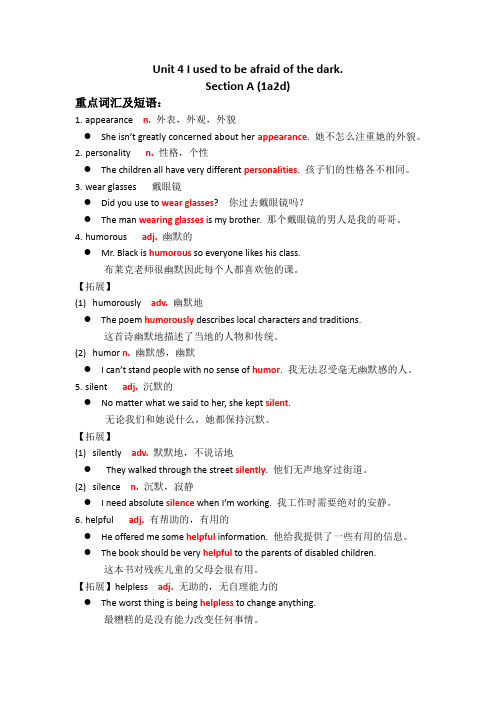
Unit 4 I used to be afraid of the dark.Section A (1a2d)重点词汇及短语:1.appearance n.外表,外观,外貌●She isn’t greatly concerned about her appearance. 她不怎么注重她的外貌。
2.personality n.性格,个性●The children all have very different personalities. 孩子们的性格各不相同。
3.wear glasses 戴眼镜●Did you use to wear glasses? 你过去戴眼镜吗?●The man wearing glasses is my brother. 那个戴眼镜的男人是我的哥哥。
4.humorous adj. 幽默的●Mr. Black is humorous so everyone likes his class.布莱克老师很幽默因此每个人都喜欢他的课。
【拓展】(1)humorously adv. 幽默地●The poem humorously describes local characters and traditions.这首诗幽默地描述了当地的人物和传统。
(2)humor n. 幽默感,幽默●I can’t stand people with no sense of humor. 我无法忍受毫无幽默感的人。
5.silent adj. 沉默的●No matter what we said to her, she kept silent.无论我们和她说什么,她都保持沉默。
【拓展】(1)silently adv.默默地,不说话地●They walked through the street silently. 他们无声地穿过街道。
(2)silence n. 沉默,寂静●I need absolute silence when I’m working. 我工作时需要绝对的安静。
人教版英语9年级上册第4单元sectionA知识点总结
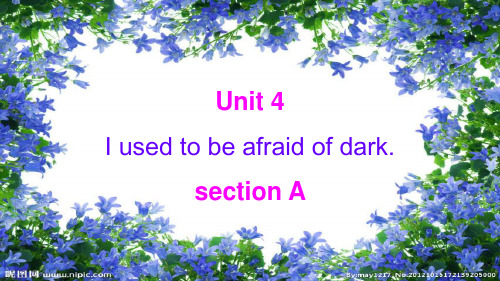
14. giving a speech in public. 当众做演讲。
give a speech =give a talk 作演讲;作报告 They invited him to give a speech.
in public=in public places在公共场合,当众;公开。 I don’t want to speech about it in public.我不想当众说这事
( B ) 4. — Only a small number of students ___able to pass the exam.
— Yes. The number
no more than 20.
A. is; is
B. are; is
C. is; are
D. are; are
( D ) 5. — Andy says his team will win the cup in the final.
( D ) 2. — I am like a cat on hot bricks. There are so many
problems that I don’t know
to deal with them.
— Calm down first. Let’s see what I can do for you.
我过去在学校里不受欢迎,但是现在我去到哪里都受到极大关注。
tons of 大量的;许多的, 后接可数名词复数或不可数
名词。
They’ve got tons of money. 他们腰缠万贯。 I bought tons of apples while they were cheap.
我趁苹果便宜的时候买了许多。
人教版九年级英语第四单元 Unit 4 Section A 知识点精讲
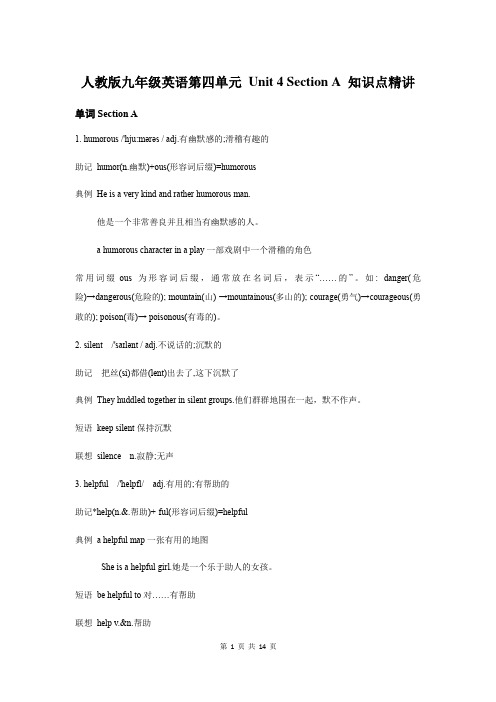
人教版九年级英语第四单元Unit 4 Section A 知识点精讲单词Section A1. humorous /'hju:mərəs / adj.有幽默感的;滑稽有趣的助记humor(n.幽默)+ous(形容词后缀)=humorous典例He is a very kind and rather humorous man.他是一个非常善良并且相当有幽默感的人。
a humorous character in a play一部戏剧中一个滑稽的角色常用词缀-ous为形容词后缀,通常放在名词后,表示“……的”。
如: danger(危险)→dangerous(危险的); mountain(山) →mountainous(多山的); courage(勇气)→courageous(勇敢的); poison(毒)→ poisonous(有毒的)。
2. silent /'saɪlənt / adj.不说话的;沉默的助记把丝(si)都借(lent)出去了,这下沉默了典例They huddled together in silent groups.他们群群地围在一起,默不作声。
短语keep silent保持沉默联想silence n.寂静;无声3. helpful /'helpfl/ adj.有用的;有帮助的助记*help(n.&.帮助)+-ful(形容词后缀)=helpful典例a helpful map一张有用的地图She is a helpful girl.她是一个乐于助人的女孩。
短语be helpful to对……有帮助联想help v.&n.帮助常用词缀形容词后缀-ful通常位于既可用作动词也可用作名词的单词后,常见的词有use→ useful(有用的); thank→ thankful(感激的);care→ careful(细心的)等。
4. score /skɔː(r)/ n.&v.得分;进球助记sore(疼痛的)中间加个c,得分/进球光疼是不够的。
Unit4SectionA【精品课】九年级英语全一册自学手册(人教版)含答案

答卷时应注意事项1、拿到试卷,要认真仔细的先填好自己的考生信息。
2、拿到试卷不要提笔就写,先大致的浏览一遍,有多少大题,每个大题里有几个小题,有什么题型,哪些容易,哪些难,做到心里有底;3、审题,每个题目都要多读几遍,不仅要读大题,还要读小题,不放过每一个字,遇到暂时弄不懂题意的题目,手指点读,多读几遍题目,就能理解题意了;容易混乱的地方也应该多读几遍,比如从小到大,从左到右这样的题;4、每个题目做完了以后,把自己的手从试卷上完全移开,好好的看看有没有被自己的手臂挡住而遗漏的题;试卷第1页和第2页上下衔接的地方一定要注意,仔细看看有没有遗漏的小题;5、中途遇到真的解决不了的难题,注意安排好时间,先把后面会做的做完,再来重新读题,结合平时课堂上所学的知识,解答难题;一定要镇定,不能因此慌了手脚,影响下面的答题;6、卷面要清洁,字迹要清工整,非常重要;7、做完的试卷要检查,这样可以发现刚才可能留下的错误或是可以检查是否有漏题,检查的时候,用手指点读题目,不要管自己的答案,重新分析题意,所有计算题重新计算,判断题重新判断,填空题重新填空,之后把检查的结果与先前做的结果进行对比分析。
亲爱的小朋友,你们好!经过两个月的学习,你们一定有不小的收获吧,用你的自信和智慧,认真答题,相信你一定会闯关成功。
相信你是最棒的!人教版新目标九年级英语自学手册知识点解析+ 语法讲练+短语归纳+ 自我检测Unit 4 I used to be afraid of the darkSection A1. Mario, you used to be short, didn’t you? 马里奥,你过去很矮,是吗?(Page 25 1a)(1)used to意为"过去常常",后接动词原形,表示过去经常发生的动作或存在的状态(暗含现在已经不复存在)。
►He used to play basketball at school. 他过去常常在学校里打篮球。
- 1、下载文档前请自行甄别文档内容的完整性,平台不提供额外的编辑、内容补充、找答案等附加服务。
- 2、"仅部分预览"的文档,不可在线预览部分如存在完整性等问题,可反馈申请退款(可完整预览的文档不适用该条件!)。
- 3、如文档侵犯您的权益,请联系客服反馈,我们会尽快为您处理(人工客服工作时间:9:00-18:30)。
Unit4 What would you do?熟记以下短语:1、give it to charity 把它捐给慈善机构2、medical research 医学研究3、What if ……如果…怎么样?4、get nervous 紧张5、take a big exam 参加大考6、help with 有助于7、in public 在公共场合8、hardly ever 几乎不9、the whole school 全校10、without permission 为经许可11、be(make) friends with 与…交朋友12、ask one’s permission 请求××的允许13、introduce…to…把…介绍给…14、invite…to do…邀请…干…15、social situations 社会环境16、not…in the slightest 根本不,一点也不17、right away 立刻,马上18、all day 全天19、be friendly to 对…友好20、at lunch time 在午饭时间21、a bit shy 有点害羞22、English speech contest 英语演讲比赛23、represent the class 代表班级24、come top 名列第一(前茅)25、let …down 使…失望26、come up with 提出、想出27、be sure of + n./pron.be sure to do 相信…be sure +that 从句28、the rest of the students 其余的学生29、have a lot of experience (in) doing sth 在做某事方面有经验30、deal with 对付,处理31、come out 出版32、give advice on…在…方面提出意见、建议33、by accident 偶然地,无意之中34、hurry to do sth 匆匆忙忙干…35、an internet friend 网友Section A重点语法:1.If I were you, I’d wear a shirt and tie.1 .tie n 领带,平局,得分相同,不分胜负V 拴,扎,系,绑现在分词tying句型:tie sth .to …把…栓到…上if 引导的非真实性条件状语从句,即“虚拟语气”。
通过动词形式的变化来表示说话人对发生的动作或存在的状态所持的态度或看法的动词形式称为语气,虚拟语气表示说话人所说的话不是事实,而是一种祝愿,建议或是与事实相反的假设等。
if 引导的条件状语从句分为真实和非真实条件句,非真实条件句应用虚拟语气。
如果要即:(从句)if +主语+动词过去式(be 动词用were), (一般过去时)(主句) 主语+would+动词原形(过去将来时)如:If I had time, I would go for a walk.如果我有时间,我就会去散步。
(事实上我现在没有时间)If I were you, I would take an umbrella.假如我是你的话,我会带上雨伞。
(事实上我不是你)I would say no if someone asked me to be in a movie.假如有人请我当电影演员,我会表示拒绝。
(事实上瑞没有人请我当电影演员)2 I can’t sleep the night before I take a big exam.在重大考试前夜,我无法入睡Sleep n 睡眠v 睡觉,入睡Sleepy adj困倦的,昏昏欲睡的,Sleepless adj 不睡的,失眠的Asleep adj 熟睡的,睡着的,常用来作表语或宾语补足语,不能做定语Practice1, How many hours do teenagers _______ every night? (sleep, asleep)2 How long has the baby been ______?(sleep, asleep)3 He felt ______ because of the boring movie.( asleep ,sleepy)4 He can’t do it well with a_____nigh t.(sleepy, sleepless)翻译句子,一空一词1 在沙发上睡觉不是很舒服。
______ _______ _______ ______is not very ______.2 我爸爸一上床就睡着了。
My father _______ _______ as soon as he ______ _____ ______.3 那场比赛以平均而结实。
The game ______ in ______.4 那只狗一定要拴在树上,孩子们都很害怕它。
The dot ______ _____ ______ ______ the tree.The children here are afraid of it.5 如果我变得富有,我将周游世界。
If I ______ ______, I ______ ______ ______ ______ _______6 如果我是你的话,我不会要那钱的。
I ______ ______ the money ______ ______ _______ ______.7 如果当时人人豆懂急救,许多人就会的就。
If everyone ______ first aid then, many lives ______ ______ ______.8如果明天我有空,我回去拜访你的。
If I _____ ______ tomorrow, I _____ _____ you.1.If you had a million dollarsMillion 与具体数字连用时,用单数表示确切的数量Two million for millionMillion 在表示不确定的数量时,也就是说数目较大,常用millions of 数以百计的类似短语:hundreds of thousands of2 I’d give it to medical research.Medical adj 医学的,医疗的,medicine n 药,药剂短语medical care 医学护理Medicine for 治…..病的药Take/have medicine 吃药Research v 调查研究短语:do/make/carry out research 做、进行大量的研究工作Research on/in/into/for 研究……3 What if everyone else bring a present?what if + 从句如果…怎么办,要是… 又怎么样用来询问将来如果发生什么事,我们该怎么办、在以if引导的条件状语从句中常用一般现在时表示将来的动作。
如:What if she doesn’t come? 要是她不来怎么办?What if Li Lei knows? 如果李雷知道了怎么办?Practice1 _______ trees should be planted every year.A ThousandB Thousand ofC Five thousandsD Thousands of2 _______ people have watched the game on TV.A MillionB Million ofC Several millionsD Millions of3 _______ students joined the club.A Three hundredB HundredsC Three hundredsD Three hundreds of4 _______ we don’t have presents with us ?A What aboutB What ifC No matter whatD If5 _______ a new car?A What about buyB What about buyingC What about to buyD What about we buy翻译句子,一空一词1.他一天吃三次药He _____ the _____ ______ _____ ______ _____.2 她学习医疗护理。
She ______ learns _______ _______.3 他们对这一题目做了大量的研究工作。
They _______ _______ a good deal of _______ ______ this subject.选择填空:1.My father would rather stay at home and sleep than ______ to the concert.A goB goingC wentD has gone2 If I _____ a thousand dollars, I would buy a football.A will winB winC have wonD won3 Something must be done to ______ this kind of thing ______.A stop ,happenB stopped ,happenC stop ,happeningD stop,to happen4 I’d like to go _______.A somewhere relaxingB relaxing somewhereC anywhere relaxingD relaxing any where5 Have you decided ______ Shanghai?A to visitB visitC visitingD to visit to6 There are so many CDs here that I don’t know _______.A to buy which oneB which to buy oneC which one to buyD to buy one which7 Children ______ h ave at least eight hours’ sleep.A shouldB shallC mayD can8 It took him ______ morning to check out _______ information.A the whole,all theB whole, the allC the whole ,the allD the whole, all of9 There is hardly ______ milk in the bottle, _______ there?A no, isn’tB some, isC little, isn’tD any , is10 There are ______ of visitors in that country every year.A several millionsB many millionC about three millionsD after three million。
